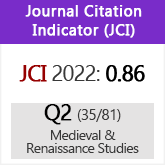Las oligarquías urbanas de Pamplona y Tudela en 1366. Dos comportamientos diversoJ ante el fisco real navarro
DOI:
https://doi.org/10.3989/aem.1992.v22.1084Abstract
The Libro de fuegos de 1366 (The Book on Habits and Customs of 1366) is the only text that allows us to study, in details, the way in which the inhabitants of the two main cities of the realm, Pamplona and Tudela, used to contribute in the tax system. Among a very reduced series of fiscal censuses in Navarra during the Middle Ages, this book is quite unique because it registers both the name of the heads of family and the quota asigned to each one. The meticulous revision of the original manuscript, which transcription by J. Carrasco in 1973 helped us to study it in detail -as well as complementary information obtained through other sources allows us to find surprising conclusions. One of them is that the 33 families of the high bourgeoisie in Pamplona paid, on an average, scarcely 3 florins while the average of the 68 most famous lineages in Tudela contributed with 8 florins. We do not know the reasons for this important difference, Tudela's families exceed largely the average of 2,5 florins per family, foreseen for the realm as a whole. We also ignore the reasons why, in Tudela, the four levels of quota (1, 2, 3 and 4 florins) established far that peculiar year by royal norms are not respected.
Downloads
Download data is not yet available.
Downloads
Published
1992-12-30
How to Cite
Zabalo Zabalegui, J. (1992). Las oligarquías urbanas de Pamplona y Tudela en 1366. Dos comportamientos diversoJ ante el fisco real navarro. Anuario De Estudios Medievales, 22(1), 665–709. https://doi.org/10.3989/aem.1992.v22.1084
Issue
Section
Monographies
License
Copyright (c) 2020 Consejo Superior de Investigaciones Científicas (CSIC)

This work is licensed under a Creative Commons Attribution 4.0 International License.
© CSIC. Manuscripts published in both the printed and online versions of this Journal are the property of Consejo Superior de Investigaciones Científicas, and quoting this source is a requirement for any partial or full reproduction.All contents of this electronic edition, except where otherwise noted, are distributed under a “Creative Commons Attribution 4.0 International” (CC BY 4.0) License. You may read here the basic information and the legal text of the license. The indication of the CC BY 4.0 License must be expressly stated in this way when necessary.
Self-archiving in repositories, personal webpages or similar, of any version other than the published by the Editor, is not allowed.














